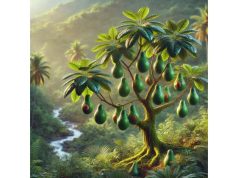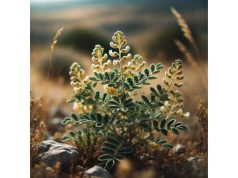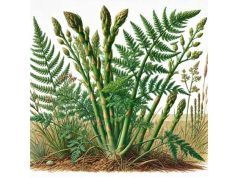
Absinth wormwood is a fiercely bitter herb with a long, complicated relationship to both medicine and culture. In herbal practice, it is best understood as a “small-dose” plant: a little can go a long way, especially for appetite, digestion, and the sluggish, heavy feeling that sometimes follows meals. Much of its traditional value comes from bitter compounds that signal the gut to get moving—an effect people often notice within days rather than weeks.
Wormwood is also famous for what it contains: thujone, a compound that can be irritating to the nervous system at high doses. That single detail changes how you should approach the herb. When used thoughtfully—short term, measured, and in the right form—wormwood can be a useful tool. When used carelessly, it is one of the herbs most likely to cause unnecessary side effects.
Essential Insights
- May support appetite and ease mild dyspepsia when used short term.
- Typical adult tea dose: 1–1.5 g dried herb per 150 ml, totaling 2–3 g per day.
- Avoid ingesting essential oil or high-dose concentrates due to thujone-related neurotoxicity risk.
- Avoid during pregnancy and breastfeeding, and if you have epilepsy or a seizure history.
Table of Contents
- What is absinth wormwood
- Key ingredients in Artemisia absinthium
- Health benefits and advantages
- Common uses and preparation forms
- How much Artemisia absinthium per day
- Side effects, interactions, and cautions
- What research actually shows
What is absinth wormwood
Absinth wormwood (also called common wormwood or simply wormwood) is a silver-green, aromatic plant in the daisy family (Asteraceae). Herbalists typically use the above-ground parts—leaves and flowering tops—dried and prepared as a tea, tincture, or powdered herb. Its defining feature is intensity: it is among the bitterest commonly used herbs, and that bitterness is not just a taste preference—it is part of how the plant “signals” the body.
Bitter herbs can trigger a chain reaction sometimes described as a digestive reflex. When bitter receptors in the mouth and upper gut are stimulated, many people experience increased salivation, a warming sensation in the stomach, and a subtle shift toward “ready to digest.” For some, that translates into better appetite before meals or less heaviness after eating. For others—especially those prone to reflux or a sensitive stomach—the same stimulation can feel like irritation. That is why wormwood is often better as a short, measured trial than a daily habit.
Wormwood is also tied to absinthe, the anise-flavored spirit that historically used wormwood as one of its botanicals. Modern absinthe is regulated in many regions to control thujone content, and the drink’s effects are primarily from alcohol, not from wormwood acting as an herb. In supplement form, however, you may encounter wormwood extracts that vary widely in strength, composition, and thujone content—one reason dosing and product selection matter more here than with many gentler herbs.
A common point of confusion is mixing up wormwood species. Sweet wormwood (Artemisia annua) is a different plant with different primary uses and compounds. Mugwort (Artemisia vulgaris) is also related but not interchangeable. If a label only says “Artemisia,” that is not precise enough for safe self-use.
If you approach absinth wormwood as a targeted bitter—small dose, short duration, clear goal—you are far more likely to get benefit and far less likely to run into problems.
Key ingredients in Artemisia absinthium
Wormwood’s effects come from a mix of bitter principles, aromatic oils, and plant polyphenols. The exact balance can shift with growing conditions and “chemotype” (a plant’s naturally occurring chemical pattern), which is one reason wormwood products can feel noticeably different from one brand to another.
Key compound families to know:
- Bitter sesquiterpene lactones (often discussed as absinthin and related lactones)
These are largely responsible for wormwood’s signature bitterness. Bitter lactones are not “stimulants” in the caffeinated sense; instead, they tend to work through taste and digestive signaling. In practice, this is why wormwood is often taken before meals for appetite support or after meals for mild dyspepsia. - Essential oil components (including thujone and other terpenes)
Wormwood’s essential oil fraction contains volatile compounds that contribute to its sharp aroma. Thujone is the compound most associated with safety concerns, because at higher exposures it can affect nervous system signaling. This is why ingesting wormwood essential oil is widely considered a poor idea: it is far easier to overdo the volatile fraction than it is with a measured tea made from the whole herb. - Flavonoids and phenolic acids
Many Artemisia species contain flavonoids and phenolic acids that have antioxidant and inflammation-modulating activity in lab settings. In real life, these compounds are part of a “supporting cast.” They may contribute to the herb’s overall profile, but they do not erase the central practical truth: wormwood behaves like a strong bitter, and the dose should match that role. - Tannins and other minor constituents
Depending on preparation, wormwood may also deliver mild astringency. For some people, that can feel settling; for others, it can feel drying or irritating if used frequently.
A useful way to think about wormwood is to separate whole-herb preparations (tea, modest tinctures, standardized traditional forms) from concentrated volatile products (essential oil, strong extracts without clear labeling). Whole-herb forms tend to emphasize bitterness and gentler aromatics; concentrated volatile products can emphasize thujone-related effects and side effects.
If you want wormwood’s classic benefit profile, you typically want the bitter fraction in a measured amount—not a concentrated oil.
Health benefits and advantages
People reach for absinth wormwood for a few recurring reasons: appetite support, digestive comfort, and a sense of “reset” after dietary lapses or travel. Historically, it has also been used in parasite-focused protocols and bitters formulas, though modern self-care should be cautious and evidence-aware.
Benefits that are most plausible for typical home use:
- Temporary appetite support
Bitter herbs are often used when appetite is low due to stress, recovery, or disrupted routines. Wormwood’s bitterness can make “food interest” return more naturally for some people. The advantage here is speed: if it is going to help, you often notice within several days. If nothing changes after 7–10 days, pushing the dose higher is rarely the smartest next step. - Mild dyspepsia and post-meal heaviness
Dyspepsia is a broad bucket—bloating, fullness, slow digestion, mild cramping, or nausea after eating. Wormwood may help when symptoms relate to sluggish digestion or low digestive tone. The advantage is that it can be used situationally (after heavier meals) rather than continuously. - Digestive support when microbes are part of the picture
Wormwood extracts show antimicrobial activity in laboratory testing. In the real world, that does not mean it “treats infections,” but it helps explain why wormwood appears in traditional approaches for digestive discomfort linked to food-borne upset or travel. The practical takeaway: it may be reasonable as supportive care for mild, self-limited issues, but it is not a substitute for medical evaluation when fever, blood in stool, dehydration, severe pain, or persistent symptoms appear.
Benefits that are more speculative or situation-dependent:
- Inflammation and immune signaling
Early clinical research in inflammatory bowel conditions has explored wormwood-containing preparations. This is intriguing, but it is not a green light for self-treatment. The advantage here is potential—but the limitation is that results depend heavily on the exact preparation, dose, and the condition being treated. - General “detox” or liver support claims
Wormwood is sometimes marketed this way, but the more accurate framing is digestive and bitter support, not detoxification. If you have liver disease or bile duct issues, wormwood is a herb to discuss with a clinician, not experiment with.
Overall, wormwood’s biggest advantage is also its biggest constraint: it is potent. That potency can help you keep doses small and short, but it also means you should be more conservative with frequency, duration, and product strength than you might be with gentler digestive herbs.
Common uses and preparation forms
Wormwood is not a “sprinkle it on everything” herb. The best results usually come from choosing a form that matches your goal, then using it consistently for a short window while you pay attention to response.
Common forms and how they are typically used:
- Herbal tea (infusion)
This is the most traditional home preparation and often the easiest to dose conservatively. The taste is intensely bitter; many people prefer to blend it with aromatic herbs like mint or chamomile to improve tolerance. If bitterness is the point, you do not need a large mug—smaller volumes can be enough. Practical method:
- Measure the dried herb accurately (a small kitchen scale helps).
- Pour hot water over it and steep briefly.
- Start with a small serving to assess tolerance.
- Use for a limited duration rather than indefinitely.
- Tincture
Tinctures can be convenient because you can adjust dose drop by drop. The downside is variability: not all tinctures disclose herb-to-solvent ratio or thujone considerations clearly. Choose products that specify Artemisia absinthium, extraction ratio, and suggested adult dosing. Use the label as your ceiling, not your starting point. - Powdered herb (capsules or loose powder)
This form avoids taste, which is helpful for some people. However, the lack of bitter taste cues can make it easier to overdo it. If you use capsules, treat them like a measured course: same dose, same time, short duration, and stop if adverse effects show up. - Digestive bitters blends
Wormwood is sometimes included in bitters formulas with gentian, orange peel, or other botanicals. These blends can be gentler and more balanced than straight wormwood. If you are sensitive, a bitters blend may be a better entry point than wormwood alone. - Topical use
Some traditions use wormwood externally, but topical use should be cautious. Essential-oil-heavy preparations can irritate skin. If you try a topical product, patch-test first and avoid broken skin.
Quality and selection tips that prevent common mistakes:
- Confirm the species name is written out: Artemisia absinthium.
- Avoid products that emphasize essential oil ingestion.
- Prefer products with clear dosing guidance and conservative serving sizes.
- Store dried herb away from heat and light; aroma loss often signals potency loss.
Used this way, wormwood becomes a practical tool you can trial, assess, and stop—rather than an open-ended supplement.
How much Artemisia absinthium per day
With wormwood, dosing is less about “more is better” and more about finding the smallest amount that produces the digestive signal you want—without irritation. Many traditional frameworks treat wormwood as a short course measured in days to weeks, not months.
A conservative, adult-oriented dosing range commonly used in formal herbal monograph guidance:
- Tea (infusion): 1–1.5 g dried herb infused in about 150 ml hot water per serving; total daily amount commonly limited to 2–3 g per day.
- Powdered herb: daily totals around 2.28 g per day, often split across the day.
- Expressed juice (fresh herb preparations): totals around 10 ml per day in divided doses when used in traditional products.
- Tincture (specified traditional preparations): totals around 3 g per day, typically split into multiple doses.
Timing matters as much as amount:
- For appetite support, wormwood is often taken about 30 minutes before meals so the bitter signal arrives before eating.
- For mild dyspepsia, it is commonly taken after meals to support post-meal comfort.
Duration guidance is a safety feature, not a suggestion:
- If symptoms persist longer than 2 weeks, it is a good moment to pause self-treatment and consult a qualified clinician. Persistent digestive symptoms can reflect reflux disease, ulcers, gallbladder issues, medication effects, infections, or inflammatory conditions that deserve targeted care.
How to personalize without drifting into risky dosing:
- Start at the low end (for tea, consider the smallest measured serving).
- Use one goal (appetite or post-meal heaviness), not a vague “wellness” target.
- Track response for 3–7 days: appetite cues, bloating, nausea, reflux, sleep, and mood.
- Do not escalate aggressively if you feel “nothing.” With wormwood, lack of benefit is a signal to stop, not to double down.
If you are taking multiple bitter herbs, the combined effect can add up. In that case, reduce wormwood first rather than stacking several bitters at full dose.
Side effects, interactions, and cautions
Wormwood is one of the herbs where “natural” does not automatically mean “low risk.” Most problems come from either excessive dose, overly concentrated extracts, or using essential oil preparations internally.
Possible side effects (more likely as dose increases):
- Nausea, stomach burning, or worsening reflux
- Abdominal cramping or diarrhea
- Headache, dizziness, or restlessness
- Sleep disruption in sensitive individuals
- Allergic reactions (especially in people sensitive to Asteraceae family plants)
The thujone issue, in plain terms:
Thujone can affect nervous system signaling at high exposures. In real-world use, the highest-risk scenarios are not modest tea doses of the dried herb; they are essential oils, highly concentrated extracts, or long-term use that quietly accumulates exposure. Symptoms of excessive exposure can include agitation, confusion, tremor, and—in severe cases—seizure risk.
Interactions and situations that call for extra caution:
- Seizure disorders or epilepsy: avoid, given thujone-related neurotoxicity concerns.
- Medications that affect the nervous system: be cautious if you use sedatives, sleep medications, or any therapy where lowering seizure threshold would be dangerous.
- Anticoagulants or complex medication regimens: wormwood contains multiple constituents that may complicate predictability; if you rely on stable medication dosing, discuss herb use with a clinician or pharmacist.
- Alcohol use: avoid combining wormwood supplementation with heavy alcohol intake; the pairing can increase strain on the nervous system and worsen side effects.
Practical “red flag” rules:
- Stop immediately if you develop neurologic symptoms (marked dizziness, tremor, unusual agitation).
- Stop if digestive symptoms worsen after a few doses rather than improve.
- Seek medical care promptly for severe abdominal pain, black stools, blood in stool, fainting, or signs of dehydration.
The safest wormwood pattern is also the simplest: measured dose, short duration, clear reason, and no essential oil ingestion.
What research actually shows
Wormwood sits in an unusual evidence category. It has strong traditional usage for appetite loss and mild digestive complaints, clear pharmacologic plausibility because of its bitter compounds, and a growing body of laboratory research. But the leap from lab findings to reliable, repeatable human outcomes is not automatic—especially when products vary.
What the research supports most confidently:
- Traditional digestive indications are coherent and practical. Formal herbal monographs describe wormwood as a traditional option for temporary appetite loss and mild dyspeptic complaints. This aligns with how bitters are used across many traditions: small dose, before or after meals, short duration, and reevaluate if symptoms persist.
- Antimicrobial activity is consistent in vitro, with multiple extracts showing activity against common microbes in lab testing. The careful interpretation is “supportive potential,” not “treatment.” Digestive symptoms can have many causes, and self-treating a true infection is not appropriate.
Where the evidence is intriguing but limited:
- Inflammatory bowel conditions. Small controlled trials in Crohn’s disease have reported improvements in inflammatory markers and symptoms using specific wormwood preparations and dosing schedules. These are not large, definitive trials, and they do not justify replacing standard medical therapy. They do, however, support a reasonable scientific question: certain wormwood preparations may influence inflammatory signaling in select contexts.
- Inflammation and oxidative stress biomarkers. Animal and mechanistic studies suggest anti-inflammatory effects, but these models do not map neatly to everyday symptom relief. They are best treated as hypothesis-generating, not as personal medical guidance.
The biggest limitation across studies is standardization. “Wormwood” can mean:
- dried herb tea with modest extraction,
- alcoholic tincture with a different chemical profile,
- non-alcoholic extracts emphasizing polyphenols,
- essential oil concentrates with a far higher volatile fraction.
Those are not interchangeable, and research on one does not automatically apply to another.
A practical evidence-based approach for readers:
- Use wormwood for clear, mild targets (appetite dip, mild dyspepsia), not complex chronic symptoms.
- Choose whole-herb preparations and avoid essential oil ingestion.
- Treat it as a time-limited trial and reassess quickly.
- If you are dealing with persistent, severe, or systemic symptoms, use wormwood only with professional guidance—because the condition, not the herb, is the priority.
In other words, wormwood has a legitimate place in herbal self-care, but it earns that place through restraint and specificity, not through hype.
References
- European Union herbal monograph on Artemisia absinthium L., herba 2020 (Guideline)
- New Evidence for Artemisia absinthium L. Application in Gastrointestinal Ailments: Ethnopharmacology, Antimicrobial Capacity, Cytotoxicity, and Phenolic Profile 2021 (Open Access Study)
- Toxicity of Selected Monoterpenes and Essential Oils Rich in These Compounds 2022 (Review)
- New Evidence for Artemisia absinthium as an Alternative to Classical Antibiotics: Chemical Analysis of Phenolic Compounds, Screening for Antimicrobial Activity 2023 (Open Access Study)
- Wormwood (Artemisia absinthium) suppresses tumour necrosis factor alpha and accelerates healing in patients with Crohn’s disease – A controlled clinical trial 2010 (Randomized Controlled Trial)
Disclaimer
This article is for educational purposes only and does not provide medical advice, diagnosis, or treatment. Herbal products can cause side effects and interact with medications, and wormwood is a high-caution herb due to thujone-related risks at higher exposures. If you are pregnant or breastfeeding, have a seizure disorder, liver or bile duct disease, chronic gastrointestinal symptoms, or take prescription medications, consult a qualified healthcare professional before using wormwood. Seek prompt medical care for severe or persistent symptoms, signs of dehydration, blood in stool, fainting, or neurologic symptoms.
If you found this guide useful, consider sharing it on Facebook, X (formerly Twitter), or any platform you prefer so others can make safer, better-informed choices.






